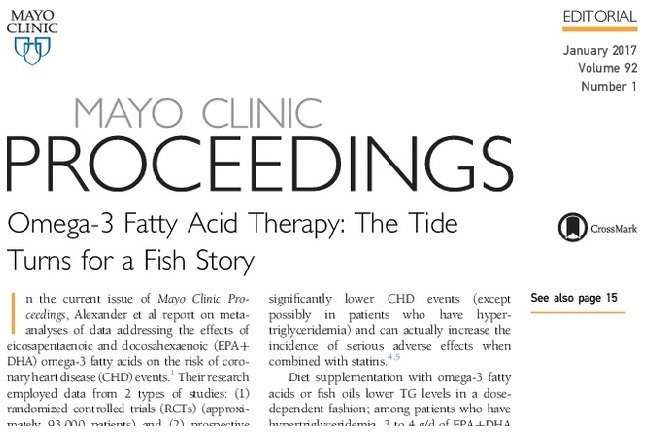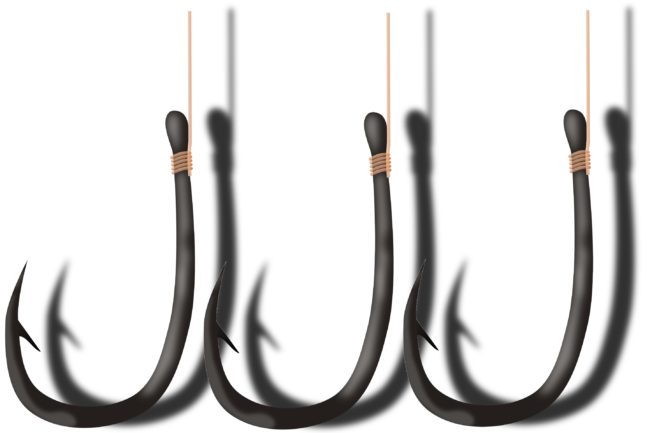The Dirty Secret of the Fish Oil Supplement Industry
Summary: The omega-3 fish oil supplement industry sponsored a controversial January 2017 research study on omega-3 fish oil supplements. Because the study was potentially tainted by funding bias, it caused the American Heart Association to fire back with a fish oil advisory of its own. [This article first appeared on the LongevityFacts.com website. Author: Brady Hartman.]
Seafood is healthy for the heart because it is rich in omega-3 fatty acids called fish oils. Health organizations, including the Mayo Clinic, the USDA, and the American Heart Association, have long urged people to eat more fish because studies show that an individual who eats seafood at least once a week is less likely to die of heart disease than one who eats none.

Omega-3 Fish Oil Supplements and Fish
If fish oil is healthy, then omega-3 fish oil supplements are also, right?
The answer depends on who you ask, the fish oil supplement manufacturers or the American Heart Association (AHA).
Publication of the Omega-3 Fish Oil Study
In March of this year, a lesser known medical journal called the Mayo Clinic Proceedings (MCP) published a systematic review of omega-3 fish oils. The research team, headed by lead author Dominik D. Alexander, Ph.D. reviewed 34 research reports that studied the effects of omega-3 fish oils on heart health. Because the fish oil study has a long published title, let’s call it the Omega-3 Fish Oil Study, for short.

Accompanying the Omega-3 Fish Oil Supplement Study, was an editorial by James H. O’Keefe, M.D. who praised the study and its conclusions, saying that study was “the most comprehensive analysis of its kind within the indexed biomedical literature.” Dr. O’Keefe trumpeted the study’s findings, especially that omega-3 fish oil supplements lowered the risk of coronary heart disease by 6% in healthy people, a result that Dr. O’Keefe admitted wasn’t statistically significant. Dr. O’Keefe is, among other things, Chief Medical Officer and founder of CardioTabs, a company that manufactures omega-3 fish oil supplements, as he disclosed at the bottom of the editorial.
Omega-3 Fish Oil Study Study Casts A Wide Net
The authors of the Omega-3 Fish Oil Study wanted to show the health benefits of fish oil supplements. The researchers gathered published research studied the effects of various fish oil sources and their effect on heart health. The authors combined evidence from studies which evaluated the health effects of whole fish and other studies which evaluated the health effects of omega-3 fish oil supplements. Their analysis included both randomized clinical trials (RCTs), as well as observational studies. Physicians consider RCTs to be the gold standard of evidence, while observational studies are a weaker form of proof.
Something’s Fishy
The Omega-3 Fish Oil Study was funded by the Global Organization for EPA and DHA Omega-3s (GOED), an industry trade group representing the manufacturers of omega-3 fish oil supplements. In fact, four out of five of the authors who wrote the study are consultants for the fish oil supplement industry – a fact which they declared at the bottom of the report.
It doesn’t matter that GOED played no role in the design or interpretation of the study results – as the study’s authors claimed. The plain fact of the matter is that an industry trade group funded the fish oil study and industry consultants wrote it. Wherever there is industry sponsorship, there is automatically a potential for funding bias.
Funding Bias
As discussed in an earlier article on funding bias, industry-sponsored research sometimes produces dubious ‘scientific evidence’ that misleads and confuses consumers. The funding bias problem is concentrated in the food and supplement industry, as the article says:
“..after examining over 200 research studies paid for by a food or beverage organization, researchers from Children’s Hospital Boston found that industry-funded studies were four to eight times more likely to report positive health benefits from consuming those products. “
AHA On Omega-3 Fish Oil Supplements
The Omega-3 Fish Oil Study generated headlines that confused the public. On March 13 of this year, the AHA felt compelled to set the record straight on fish oil supplements and issued a science advisory on the subject, accompanied by a press release, as I reported on earlier.
Related Article: AHA Sets Record Straight

Hooked On Omega-3
About 15 years ago, researchers issued reports praising the benefits of fish. Even the American Heart Association recommended a diet rich in fish.
Many consumers wanted the benefits of omega-3 fish oils but didn’t want to eat fish. Omega-3 fish oil supplements seem like a viable solution. If fish oils are healthy, why not just extract them and put them in a pill?
The fish oil supplement industry was born, and health-conscious Americans were hooked.

Fish Oil Sales Skyrocket
Consumer demand caused a boom in the omega-3 fish oil supplement industry. An industry which has experienced tremendous growth in the past fifteen years. Manufacturers invested in facilities and equipment and ramped up production to meet the rising demand from health-conscious consumers.
Business Stinks
The fish oil supplement business had been booming until recently. In the past few years, a school of research reports has been released showing that omega-3 fish oil supplements are inferior to whole fish. Sales of omega-3 fish oil supplements grew from around $100 million in the late 1980s and peaked at $1.3 billion in 2012.
In March 2016, Mike Urch, Contributing Editor of Seafood Source, an online magazine covering the seafood industry, reported:
“the market for direct human consumption of fish oil [omega-3 fish oil supplements] has seen years of declining sales, with a market downturn as high as 7 percent year-on-year.”

According to Mr. Urch, the decline in sales of omega-3 fish oil supplements are mainly due to poor quality, adding that the spotty quality may be the reason behind the reported lack of health benefits. Mr. Urch says that other problems plague the fish oil supplement industry, including poor quality ingredients, inconsistent quantity and mislabelling, “with some companies claiming falsely high omega-3 concentrations in their products,” according to Mr. Urch.
While consumers might purchase omega-3 fish oil capsules of inferior quality and unknown quantity, researchers who study fish oils do not. Scientists use standardized quantities of omega-3 fish oils when conducting randomized controlled trials. It’s difficult to store these oils at room temperature, as fish oils oxidize and turn rancid quickly. Some researchers have gone as far as refrigerating omega-3 fish oil capsules before giving them to their study subjects.

Omega-3 Fish Oil Supplements Aren’t Absorbed As Well
Fish is far healthier than fish oil supplements. Scientists believe that this is because the omega-3 oils contained in supplements aren’t absorbed as well as those from fresh fish. A 6-week study by Francesco Visioli and colleagues at the University of Milan showed that the active ingredients omega-3 fish oil supplements weren’t absorbed as well into the blood plasma when compared to the active ingredients in fresh fish. Another study by Penny M. Kris-Etherton, Ph.D., RD also found that the active ingredients in fish oil supplements weren’t absorbed by the body as well as with real food.
Or, it simply could be that evolution has programmed our bodies to get nutrients from whole foods. Perhaps the human body expects omega-3 fatty acids to be accompanied by a variety of other compounds, such as marine proteins. Or, it could that fish is simply healthier than red meat and poultry.
Whatever the reason, studies have shown that consuming whole fish is far healthier than omega-3 fish oil supplements. Moreover, many advocacy organizations recommend eating fish as part of a healthy diet plan, such as the mediterranean diet.
Choose Whole Fish
For those of us who have never had a heart attack, it’s time to throw away the fish oil supplements and choose whole fish.
Large organizations including the American Heart Association, the USDA, and have long recommended whole fish as the healthiest option when compared to omega-3 fish oil supplements. Fatty fish like mackerel, salmon, sardines, albacore tuna and herring are especially high in omega-3 fatty acids.
The recently released USDA 2015-2020 Dietary Guidelines for Americans encourages people to eat at least two servings of seafood at least twice weekly because of its heart and weight benefits. According to the USDA’s Economic Research Service (USDA ERS):
“For an average 2,000-calorie-per-day diet, that advice translates into at least 8 ounces of fish and shellfish per week, or about 20 percent of total protein consumption from the USDA’s protein foods group.”
The USDA ERS reports that the average American currently eats only a quarter of the recommended amount of seafood. The average pregnant woman eats less.
Fish is not only a source of omega-3 fatty acids, but it is also rich in key nutrients, including vitamin A, iron, vitamin B-12, zinc, vitamin D, magnesium, phosphorous, and potassium. When compared to other protein sources, seafood is a nutrient-dense source of dietary protein and is relatively low in calories and saturated fat.
To make the shift to more seafood and reap its health benefits, simply swap out two weekly meals for a fish dish. Canned tuna works in a pinch.

Mercury and Other Contaminants
Some people take fish oil supplements instead of eating whole fish because they are concerned about the high levels of contaminants found in wild fish. Some types of wild fish may contain high levels of contaminants – such as dioxin, polychlorinated biphenyls (PCBs) and mercury.
High Mercury Fish
Levels of these toxins are highest in older and larger predatory fish. Examples of fish typically containing the highest level of mercury contamination include tilefish, swordfish, shark, and king mackerel. Fresh water fish can be contaminated as well, so be wary of fish caught in local rivers and lakes.
Lower Mercury Fish
The FDA advises that certain types of fish are lower in mercury, including pollock, shrimp, salmon, catfish and canned light tuna.
FDA Recommendations: Fish vs. Omega-3 Fish Oil Supplements
The Food and Drug Administration (FDA) advises children and pregnant women to limit consumption of high mercury fish. The FDA encourages these groups to substitute low-mercury fish and limit consumption. The FDA does not advocate that these groups take omega-3 fish oil supplements as a replacement for whole fish.
Other groups of people don’t get a green light to consume omega-3 fish oil supplements, either. For middle-aged and older adults, the FDA states that the benefits of consuming whole fish outweigh the potential risks, as long as the FDA and EPA guidelines are followed. Furthermore, the FDA says that eating a variety of fish helps minimize adverse effects from potential contaminants.
To learn more about the health benefits of fish as well as the FDA and USDA guidelines, feel free to read this related article: about Omega-3 Fatty Acid Fish Oils.
Take Home Message
- As a rule, it’s best to be skeptical about industry-funded research coming from the food, beverage or supplement manufacturers, such as the fish oil supplement industry.
- The AHA does not recommend omega-3 fish oil supplements for the general population.
- Nor does the FDA recommend fish oil supplements for the same group. Instead, the agency recommends that children and pregnant women limit their consumption of high mercury fish and switch to low mercury fish. For older adults, consuming whole fish is preferable to taking omega-3 fish oil supplements, even considering the potential for contaminants.
- The average American eats 1/4th the recommended amount of fish.
- The USDA recommends two servings weekly. For an average 2,000-calorie-per-day diet, that translates into at least 8 ounces of fish or shellfish per week.
- Whole fish protects the heart far better than omega-3 supplements. No one knows the exact reason why.
Help Us Spread the Word
Please share this article with your friends and help us spread the word on omega-3 fish oil supplements. One simple click is all it takes. Click on any social media link on this page.
Disclaimer
1) Diagnosis, Advice, and Treatment: This article is intended for informational and educational purposes only and is not a substitute for professional medical advice, nor for the diagnosis or treatment of any medical condition. Do not start or stop taking omega-3 fish oil supplements solely based on what you have read in this article. Instead, seek the advice of a licensed physician with any questions you may have regarding a medical condition, and before changing your diet, or before beginning or changing a supplement or exercise program. 2) Photos, External Links & Endorsements: This article is not intended to endorse companies, organizations or products. Links to external websites, depiction/mention of company names or brands, are intended only for illustration and do not constitute endorsements.

All pics You need to fix all the pics .. nice article .. well written
thanks for posting this